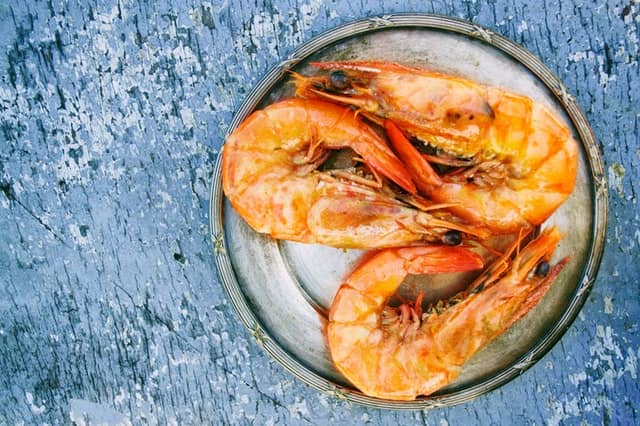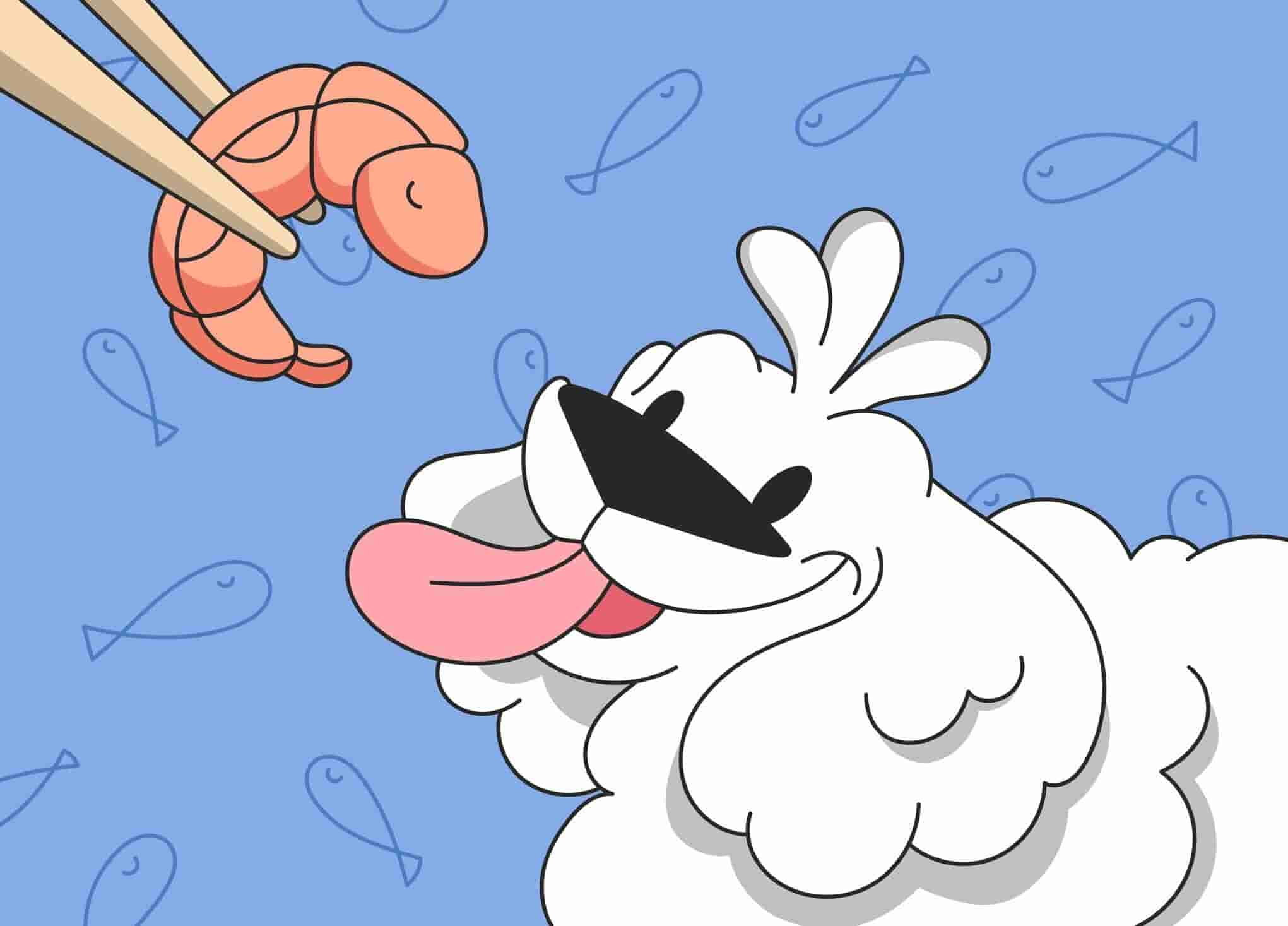Only pet parents with supernatural willpower have never given a bite of their food to their pets. I mean, it’s just a teensy little piece, what harm can it do?
Take a look at the risks and benefits of feeding your dog shrimp, and find out if shrimp is bad for dogs or is that just another myth.
- Can dogs eat shrimp?
- The Good and the Bad
- Can dogs eat raw shrimp?
- Good alternatives to shrimp
- The takeaway
- FAQ
Can dogs eat shrimp?
If you’re looking for a short answer, it would be yes - but you should avoid giving it to them. I know, it’s contradictory. That’s why you need to know all the details and not just the quick answer on whether or not you can feed shrimp to dogs.
In theory, dogs can eat cooked shrimp. These aquatic critters are full of protein and they are not toxic to dogs. Additionally, shrimp can be a great source of vitamin B12, vitamin D, selenium, and phosphorus. Shrimp also contains several key minerals, including iron, magnesium, phosphorus, zinc, copper, and manganese.
Stop Googling - Ask a Real Vet
Shrimp is rich in omega-3 fatty acids. These essential fats have been linked to a lower risk of heart disease, cancer and inflammation. However, shrimp contains more cholesterol than other types of seafood — around 190 mg per 100 g. If your pup is overweight or diagnosed with hyperlipidemia, it’s best to avoid cholesterol-rich food.
Also, if your pooch has hypertension, heart or kidney issues that require you to monitor their sodium intake, remember that farm-raised shrimp can contain as much as 700 mg of sodium per 100 g, while wild-caught frozen shrimp gives only 100 mg. This means that you should stick to wild-caught frozen shrimp as opposed to fresh farm-raised shrimp as far as sodium content is concerned.
On top of that, shrimp can cause an allergic reaction, or block your dog’s intestines.

All things considered, the risks of feeding shrimp to dogs outweigh all the benefits. But, if your dog is not allergic to shellfish, and you really want to give them shrimp, make sure you take necessary precautions. Shrimp should be thoroughly cooked, deveined, shelled, and given only as a tiny portion.
Some canines don’t have a problem with eating shrimp, but, unfortunately, there are many more that have needlessly suffered because of their appetite for fishy food, so think twice before serving your pet a prawn cocktail.
Because there are risks when dogs ingest shrimp, this may lead to a pet emergency. In fact, dogs may be susceptible to several emergency situations such as toxic ingestion and severe injuries in their lifetime. As such, having the assurance that our pets will be given the proper treatment during emergency situations without having a massive toll on our wallets can be a life-saver. Petcube’s Pet Emergency Fund may help with this.
With the Emergency Fund, you are assured of upto $3000 per year for pet emergencies for upto 6 pets. And unlike many insurance policies, the Emergency Fund doesn’t discriminate on age, breed, or medical history. There are also no out-of-pocket expenses since they pay the vet clinic directly. Apart from this, they also have an 24/7 emergency vet service, where you can consult with certified vets for guidance on first aid and emergency triage.
Luckily, we are giving an exclusive 27% off on Pet Emergency Fund subscriptions to our blog readers if you follow this link.
The Good and the Bad
In a nutshell, is shrimp good or bad for dogs? This handy chart will tell you all you need to know about shrimp:
| The Good | The Bad |
|---|---|
| Rich in protein | High in cholesterol |
| Good source of Omega-3 | Can cause an allergic reaction |
| Contains high levels of antioxidants | Risk of intestinal blockage |
Can dogs eat raw shrimp?
There is a potential for problems with cooked shrimp, but a guarantee of trouble with raw shrimp.
Raw shrimp is a source of all kinds of bacteria, including dreaded salmonella, vibrio and listeria, as well as parasites, including tapeworms. Even undercooked shrimp can make your dog sick, so if you think your pooch has gotten ahold of some raw shrimp, make sure to contact your veterinarian.
Cooking shrimp is the easiest way to kill any harmful pathogens that may be present. The best way to cook shrimp for your dog is to steam or boil it and serve it without any salt, spices or other seasonings. Fried shrimp or breaded shrimp are not the most healthy options as they increase your dog’s fat and carb intake without providing any health benefits.

Can dogs eat shrimp tails and shells?
Shells and tails also present a huge risk for canines, especially for small breeds or puppies. I know, there are a lot of pet parents out there saying “My dog ate shrimp tails and is perfectly fine!”, but that doesn’t mean your pooch will be one of the lucky ones that weren’t harmed.
Dogs can’t eat shrimp shells and shrimp tails because they are a choking hazard and can make a mess out of your dog’s intestines. Shrimp tails and shells are made of chitosan, which is difficult to digest, and their brittle, sharp texture makes them easy to get stuck inside the digestive tract or perforate the intestine wall.
Good alternatives to shrimp
Seafood, in general, is one of the riskiest food groups for canines - apart from allergies and pathogens, there is always a risk of choking and internal injuries from fish bones or shells.
If you’re looking for healthy, protein-rich treats for your pooch who loves to eat seafood, there are many alternatives to shellfish. Here are some dog-friendly foods your furball might enjoy:
- Sardines: Small, inexpensive, and nutrient rich, these tiny fish are an excellent source of protein and omega-3 for canines.
- Salmon: Serve it boneless and completely cooked. Wholesome and delicious, cooked salmon is a great treat for dogs!
- Green Lipped Mussels: Packed with essential fatty acids and glycosaminoglycans, these New Zealand mussels have been praised by canine experts for their apparent pain-relieving properties in dogs with arthritis.
Of course, there are a lot of other nutritious treat options, including store-bought goodies and home cooked yummies that are based on veggies or meat. It all depends on what your pet’s refined palate is most accustomed to!
The takeaway
Although shrimp are not toxic to dogs, it’s best to avoid giving them to your pet. They can cause an allergic reaction, can be hard to digest, and, overall, don’t make a safe choice for a treat.
Even our pet’s ancestors didn’t have any contact with critters that live in the ocean’s depths, which means that some seafood, like shellfish, were not part of their natural diet.
Opt for seafood that is safe for dogs, or other wholesome treats, rather than risking the myriad of problems that come with feeding your dog shellfish.
FAQ
Q: Can dogs eat prawns?
A: Apart from minimal differences in looks, prawns are, in essence, extremely similar to shrimp. The same rules and concerns apply to feeding your dog prawns as they do with shrimp.
Q: My dog ate shrimp shells or tails. What do I do?
A: Please contact your vet. There is a chance that the shells or tails are blocking your dog’s digestive tract, or that they have done internal damage that you are not able to see. Even though there is a chance your dog will be OK, there is always the possibility of serious issues that can even lead to the death of your pet, so it is better to be safe than sorry.
Q: Are dogs allergic to shrimp?
**A:**Just as with humans, some canines can be allergic to shellfish. Common symptoms of this allergy are:
- Vomiting
- Diarrhea
- Loss of hair
- Itchy skin
- Anaphylactic shock (rare)
Feeling guilty leaving your dog alone when traveling or working? With Petcube cameras you can monitor what your dog's eating when left alone. You will be reassured that your furball isn't going hungry or lonely.
Was this article helpful?
Help us make our articles even better










